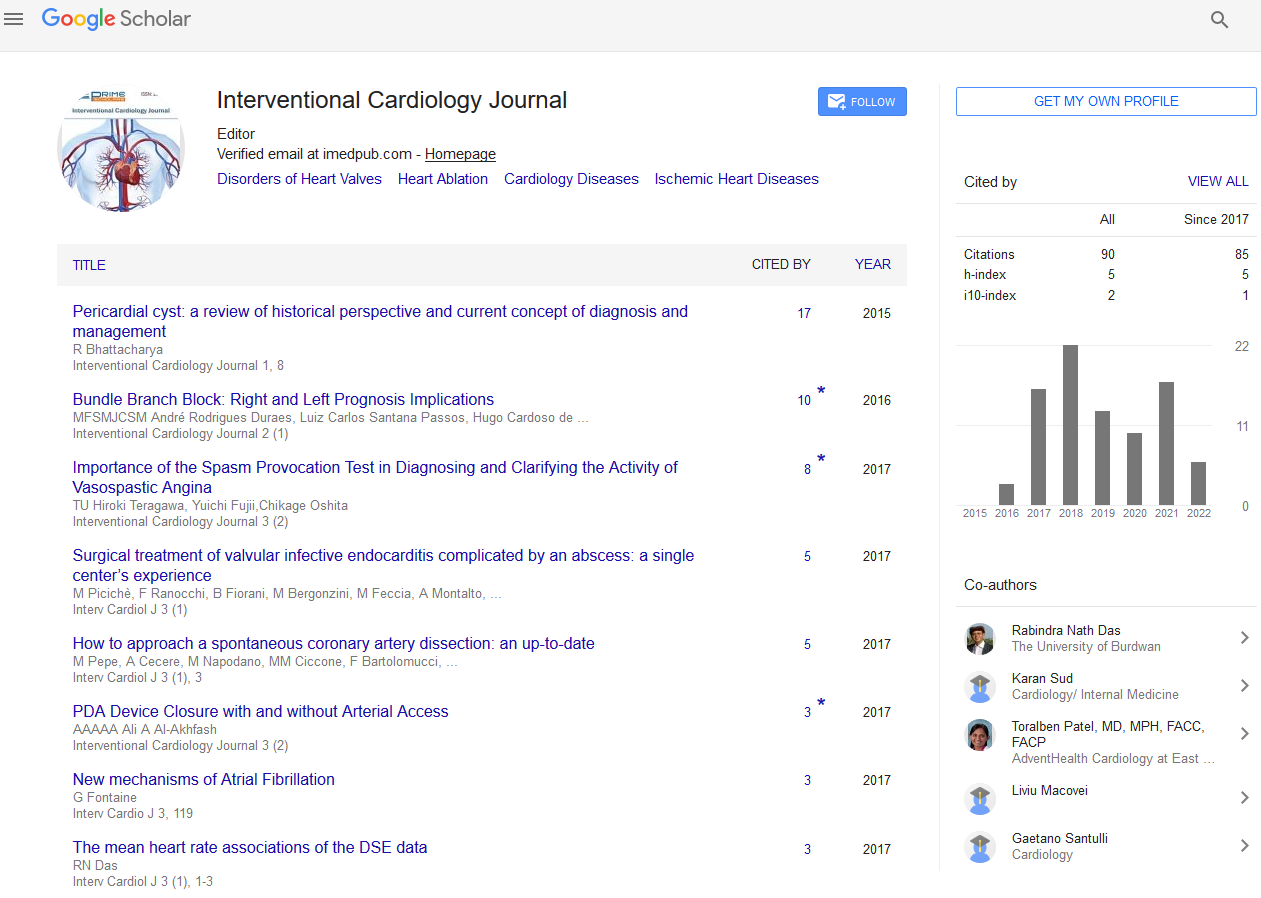Opinion - (2024) Volume 10, Issue 2
Comprehensive Management of Cardiogenic Shock: Strategies, Challenges, and Advances
David Joe*
Department of Medicine and Health, University of Sydney, Australia
*Correspondence:
David Joe,
Department of Medicine and Health, University of Sydney,
Australia,
Email:
Received: 31-Jan-2024, Manuscript No. IPIC-23-19072;
Editor assigned: 02-Feb-2024, Pre QC No. IPIC-23-19072 (PQ);
Reviewed: 16-Feb-2024, QC No. IPIC-23-19072;
Revised: 21-Feb-2024, Manuscript No. IPIC-23-19072 (R);
Published:
28-Feb-2024, DOI: 10.21767/2471-8157.10.02.18
Introduction
Cardiogenic shock is a critical condition characterized by
inadequate tissue perfusion due to severe heart failure.
It represents a medical emergency requiring prompt and
comprehensive management. This article explores the various
aspects of cardiogenic shock management, encompassing
initial assessment, therapeutic interventions, and emerging
strategies aimed at improving patient outcomes. Cardiogenic
shock occurs when the heart's ability to pump blood is
severely compromised, leading to inadequate perfusion of
vital organs. This condition often arises from acute myocardial
infarction, severe heart failure, or other critical cardiac events.
Understanding the pathophysiology is crucial for tailoring
effective management strategies. Cardiogenic shock is primarily
characterized by a significant decrease in cardiac output,
resulting in systemic hypoperfusion. The heart's inability to
effectively pump blood leads to a cascade of physiological
responses, including vasoconstriction, increased heart rate,
and activation of neurohormonal systems. Acute Myocardial
Infarction (AMI) is a common cause of cardiogenic shock. The
ischemia and damage to the myocardium impair contractility,
exacerbating pump failure. Early identification and intervention
during AMI are critical to preventing progression to cardiogenic
shock. Prompt recognition and diagnosis of cardiogenic shock
are pivotal for initiating timely interventions. The assessment
involves a combination of clinical evaluation, hemodynamic
monitoring, and diagnostic imaging. Echocardiography is
a crucial diagnostic tool for assessing cardiac function and
identifying the underlying cause of cardiogenic shock, such as
ventricular dysfunction, valvular abnormalities.
Description
Management of cardiogenic shock begins with immediate
resuscitative measures aimed at stabilizing the patient and
addressing critical hemodynamic parameters. Adequate
oxygenation is essential to support tissue perfusion.
Supplemental oxygen should be administered promptly
to maintain oxygen saturation levels. Intravenous fluid
administration may be considered cautiously to improve
preload and cardiac output. However, excessive fluid
administration should be avoided to prevent exacerbating
pulmonary congestion. Vasopressors, such as norepinephrine,
and inotropes, such as dobutamine or milrinone, are often
utilized to improve systemic vascular resistance and enhance
myocardial contractility. The selection of agents depends on
individual patient characteristics and hemodynamic profiles.
Mechanical circulatory support devices play a crucial role in
managing cardiogenic shock, providing temporary circulatory
assistance and allowing time for the heart to recover or
facilitating further interventions. Intra-Aortic Balloon Pump
(IABP) is a widely used mechanical support device that enhances
coronary perfusion and reduces afterload. However, its efficacy
in improving long-term outcomes has been questioned in
recent studies, and its use is evolving.
Conclusion
Cardiogenic shock represents a critical medical emergency
that demands prompt and comprehensive management. From
the initial assessment to advanced interventions, healthcare
providers must navigate a complex landscape to optimize
outcomes for patients. Mechanical circulatory support,
revascularization strategies, and pharmacological interventions
all play integral roles in stabilizing hemodynamics and restoring
cardiac function. Challenges, such as early recognition and
interdisciplinary collaboration, underscore the need for a
coordinated and personalized approach. Ongoing research
and emerging strategies, including biomarkers, advanced
hemodynamic monitoring, and precision medicine, offer hope
for further advancements in the field.
Citation: Joe D (2024) Comprehensive Management of Cardiogenic Shock: Strategies, Challenges, and Advances. Interv Cardiol J. 10:18.
Copyright: © 2024 Joe D. This is an open-access article distributed under the terms of the Creative Commons Attribution License, which permits unrestricted use, distribution, and reproduction in any medium, provided the original author and source are credited.

